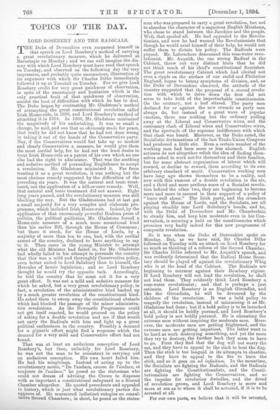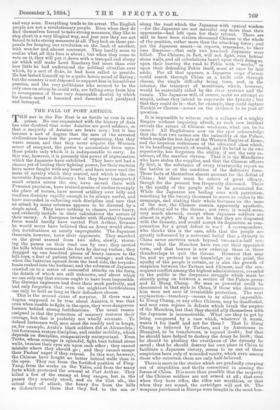TOPICS OF THE DAY.
LORD ROSEBERY AND THE RADICALS. THE Duke of Devonshire even surpassed himself in that speech on Lord Rosebery's method of carrying a great revolutionary measure, which he delivered at Barnstaple on Monday ; and we can well imagine the dis- may with which Lord Rosebery must have read that speech on Tuesday, and observed on the following day the very impressive, and probably quite unconscious, illustration of its argument with which Sir Charles Mike immediately followed it up at Tun stall on Tuesday. For we give Lord Rosebery credit for very great quickness of observation, in spite of the uncertainty and hesitation which is the only practical fruit of that quickness of observation, amidst the host of difficulties with which he has to deal. The Duke began by contrasting Mr. Gladstone's method of attempting the great constitutional revolution called Irish Home-rule, in 1886, and Lord Rosebery's method of attacking it in 1894. In 1886, Mr. Gladstone minimised the magnitude of his undertaking. It was so small a change, he said, and one that so obviously made for peace, that really he did not know that he had not done wrong in taking it out of the hands of the Conservative party. Nay, if the Conservatives would but take up so modest and clearly Conservative a measure, he would give them the most cordial help, for he had not the least desire to treat Irish Home-rule as a patent of his own which no one else had the right to administer. That was the soothing and sedative method of persuading Englishmen to accept a revolution. Mr. Gladstone minimised it. Far from treating it as a great revolution, it was nothing but the most obvious remedy suggested by the difficulties of the preceding six years. It was the natural and tonic treat- ment, not the application of a kill-or-cure remedy. Well, that natural and tonic treatment did not answer. Eight long years passed, and the revolutionary measure was still blocking the way. But the Gladatonians had at last got a small majority for a very complex and elaborate pro- gramme, which included Irish Home-rule. Indeed, by the application of that enormously powerful Brahma press of politics, the political guillotine, Mr. Gladstone forced: a Home-rule measure of a much more sensational kind than his earlier Bill, through the House of Commons ; but there it stuck, for the House of Lords, by a majority of more than ten to one, had, with the cordial assent of the country, declined. to have anything to say to it. Then came in the young Minister to attempt what the old Minister had failed in, for Mr. Gladstone had wholly failed in his attempt to persuade the country that this was a mild and thoroughly Conservative policy, even better suited to Lord Salisbury than to himself, the Hercules of heroic legislation; and so Lord Rosebery thought he would try the opposite tack. Accordingly, he told the country that he must ask it for a very great effort. It was not a mild and sedative measure for which he asked, but a very great revolutionary policy, in fact, a revolution of the administrative kind backed up by a much greater revolution of the constitutional kind. He asked them to sweep away the constitutional obstacle which had blocked the passage of the minor administra- tive revolutions. As the Newcastle Programme could not get itself enacted, he would proceed. on the policy of asking for a double revolution and see if that would. not carry the Radicals with him and light up a great political enthusiasm in the country. Possibly a demand for a gigantic effort might find a response which the demand for a very mild and Conservative effort had not found.
That was at least an audacious conception of Lord Rosebery's, but then, unluckily for Lord Rosebery, he was not the man to be consistent in carrying out an audacious conception. His own heart failed. him. He had his misgivings. Instead of acting up to the revolutionary motto, "De l'audace, encore de l'audace, et toujours de l'audace," he posed as the statesman who could not dream of advising the Crown to dispense with so important a constitutional safeguard. as a Second Chamber altogether. He quoted precedents and appealed. to history, which is just what revolutionary parties dis- approve of. He murmured indistinct eulogies on consul- tative Second. Chambers ; in short, he posed as the states- man who was prepared. to carry a great revolution, but not to abandon the character of a sagacious English Mirabeau, who chose to, stand between the Jacobins and the people. Well, that spoiled all. He had appealed to the Revolu- tionists, and now he had warned the Revolutionists that though he would avail himself of their help, he would not suffer them to dictate his policy. The Radicals were piqued. Mr. Labouchere denounced this rose-water revo- lutionist. Mr. Asquith, the one strong Radical in the Cabinet, threw out very distinct hints that he did not think much of his chief's constitutional flourishes. The great revolutionary Cabinet which had elicited not even a ripple on the surface of our stolid and Philistine England, began to betray symptoms of division, and, as the Duke of Devonshire observed, the attitude of the country suggested that the proposal of a second revolu- tion with which to drive down the first did not seem to take hold of the imperturbable constituencies. On the contrary, not a leaf stirred. The party men declared for or against the new crusade as party men always do, but instead of a great wave of popular emotion, there was nothing but the ordinary pulling away at the Liberal and Conservative wires, and the' customary clash of Liberal wires and Conservative wires,' and the spectacle of the supreme indifference with which that clash was heard. Moreover, as the Duke noted, the Socialistic declamations of the last Trade-Union Congress had produced. a little stir. Even a certain number of the working men had been more or less alarmed. English artisans do not altogether relish the idea of finding them- selves asked to work not for themselves and their families, but for some abstract organisation of labour which will reward, or decline to reward, them according to its own arbitrary standard. of merit. Conservative working men have long ago shown themselves to be a reality, and now with this rumour of a double revolution in the air, and a third and more perilous scare of a, Socialist revolu- tion behind the other two, they are beginning to become more and more in earnest in their support of a policy of " leave well alone." The Irish party, and the crusaders against the House of Lords, and the Socialists, are all playing steadily into Lord. Salisbury's hands, and he, with the Duke of Devonshire and Mr. Chamberlain to steady him, and keep him moderate even in his Con- servatism, is securing a hold on the constituencies which promises very badly indeed for this new programme of composite revolution.
So it was when the Duke of Devonshire spoke on Monday. But, as we have said, Sir Charles Dilke followed on Tuesday with an attack on Lord Rosebery for so much as thinking of a reform of the Second Chamber. Sir Charles Dille referred. to Mr. Asquith's speech, and was evidently determined. that the Radical Home Secre- tary should be played off against the revolutionary Whig who is at the head of the Cabinet. The Radicals are beginning to murmur against their Rosebery If Lord Rosebery will not lead the revolution, he shall not lead them. They evidently think Lord Rosebery a rose-water revolutionist; and that is perhaps a just estimate. Lord. Rosebery is an English Girondist, and like the Girondists, he will be devoured by the children of the revolution. It was a bold policy to magnify the revolution, instead of minimising it as Mr. Gladstone had done ; but if a bold. policy is to be launched at all, it should be boldly pursued, and Lord Rosebery's bold policy is not boldly pursued. He is alienating the extreme men without inspiring the moderate men. More- over, the moderate men are getting frightened, and the extreme men are getting impatient. The latter want to be hard at work destroying something, and yet the more they try to destroy, the further back they seem to have to go. First they find that the dog will not worry the cat, and they have to appeal to the stick to beat the dog. Then the stick is too languid. in its attempts to chastise, and they have to appeal to the fire to burn the stick, and so it goes on ad infinitum. In the meantime, the Socialists are fighting the Radicals, and the Radicals are fighting the Constitutionalists, and the Consti- tutionalists are fighting the Conservatives, and so the impulse for revolution dwindles, and the dread of revolution grows, and Lord Rosebery is more and more at sea as to where it shall be arrested, if it is to be arrested at all.
For our own parts, we believe that it will be arrested, and very soon. Everything tends to its arrest. The English along the road .which the Japanese with cynical wisdom people are not a revolutionary people. Even when they do —for the Japanese are not merciful any more than their find themselves forced to take strong measures, they like to opponents—had left open for their retreat. There are stop short in a very illogical way, andjust now they are not said to have been sixteen thousand Chinese in the whole forced to take strong measures at all. They look on these pro- of the position, rather more than the attacking force ; and posals for heaping one revolution on the back of another, yet the Japanese assert—in reports, remember, to their with wonder and almost contempt. They hardly seem to own Emperor—that only two hundred Japanese were realise what all this fuss is about ; but when they come to killed. The Chinese, in fact, will not fight, even behind vote on it, they will put it down with a tranquil and sleepy stone walls, and all calculations based upon their doing so, air which will make Lord Rosebery feel more than ever upon their barring the road. to Pekin with " works," or how little he had understood the political situation over upon their defending Pekin itself, must at once be laid which, by a sort of fluke, he had been called to preside. aside. For all that appears, a Japanese corps d'armee He has lashed himself up to a quite heroic mood of daring ; could march through China as a knife cuts through, but the country is not disposed to support him in his sublime cheese, the single difficulty being time, and, in the passion, and the very politicians who seemed to be the interior, the transport of munitions, which, however, only ones on whom he could rely, are falling away from him would be materially aided by the river systems and the in consequence of those very reasonable doubts by which canals. The Japanese will, of course, make no attempt so his heroic mood is haunted and daunted and paralysed stupid, unless they intend to supersede the dynasty ; but



















































 Previous page
Previous page